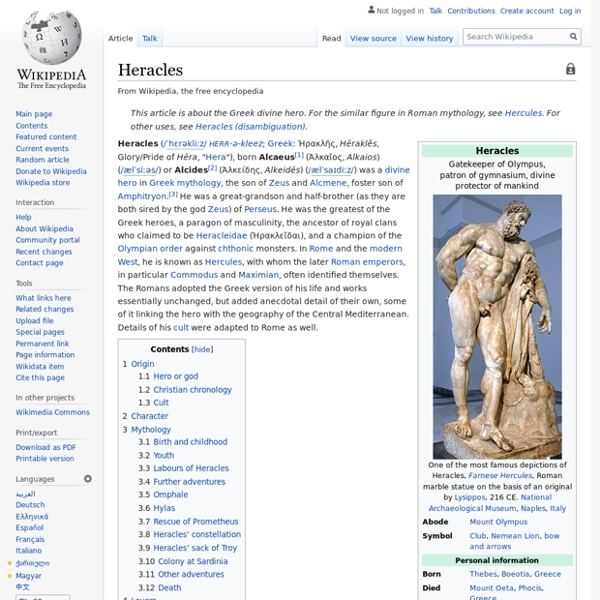Calydon
Greek city in ancient Aetolia The Laphrion sanctuary plateau of Calydon with Varasova mountain on the background. Calydon or Kalydon (; Ancient Greek: Καλυδών) was a Greek city in ancient Aetolia, situated on the west bank of the river Evenus, 7.5 Roman miles (approx. 11 km) from the sea.[1] Its name is most famous today for the Calydonian Boar that had to be overcome by heroes of the Olympian age. Mythology[edit]
Jason
We ask you, humbly: don't scroll away. Hi, reader in Canada, it seems you use Wikipedia a lot; that's great! This is the 6th appeal we've shown you. It's awkward, but this Thursday we need your help. We don't have salespeople.
Aetolia
Region of Ancient Greece Aetolia (Greek: Αἰτωλία, romanized: Aἰtōlía) is a mountainous region of Greece on the north coast of the Gulf of Corinth, forming the eastern part of the modern regional unit of Aetolia-Acarnania. Geography[edit] The Achelous River separates Aetolia from Acarnania to the west; on the north it had boundaries with Epirus and Thessaly; on the east with the Ozolian Locrians; and on the south the entrance to the Corinthian Gulf defined the limits of Aetolia.
Byzantine Empire
Roman Empire during Late Antiquity and the Middle Ages The Byzantine Empire, also referred to as the Eastern Roman Empire or Byzantium, was the continuation of the Roman Empire in its eastern provinces during Late Antiquity and the Middle Ages, when its capital city was Constantinople. It survived the fragmentation and fall of the Western Roman Empire in the 5th century and continued to exist for an additional thousand years until it fell to the Ottoman Empire in 1453. During most of its existence, the empire was the most powerful economic, cultural, and military force in Europe.
Laocoön
Trojan priest in Greek and Roman mythology Laocoön (;[1][2][Note 1] Ancient Greek: Λαοκόων, IPA: [laokóɔːn]), the son of Acoetes, is a figure in Greek and Roman mythology and the Epic Cycle.[3] He was a Trojan priest who was attacked, with his two sons, by giant serpents sent by the gods. The story of Laocoön has been the subject of numerous artists, both in ancient and in more contemporary times. Death[edit]
Christopher of Mytilene
Christophoros of Mytilene (Greek: Χριστόφορος Μυτιληναῖος, Christophoros Mytilenaios; ca. 1000 – after 1050) was a Greek-language poet living in the first half of the 11th century. His works include poems on various subjects and four Christian calendars. Biography[edit] Events described in his poems suggest that he started writing in the reign of Romanos III (1028–1034), but most poems can be dated to the reign of Constantine IX (1042–1055), an emperor who favoured culture and literature.
Oeneus
Oeneus was a king of the area of Calydon in Greek mythology, son of King Porthaon and Queen Euryte. He married Althaea, with whom he had a number of children, including Deianeira, Meleager, Toxeus, Clymenus, Periphas, Gorge, Eurymede, Perimede and Melanippe. When Artemis sent a huge boar, called the Calydonian Boar, in his lands to ravage them because he had forgotten to honour the goddess, Oeneus asked his son Meleager to gather a party of heroes to kill the creature. The party consisted of Meleager, Atalanta, and Meleager's uncles; Atalanta played a major role in successfully hunting down and killing the boar. When the time came to give the boar's skin as a prize, Meleager gave it to Atalanta, despite the protests of his uncles who believed it should be theirs by right of birth.
Abraham Cowley
17th-century English writer Abraham Cowley (;[1] 1618 – 28 July 1667) was an English poet born in the City of London late in 1618. He was one of the leading English poets of the 17th century, with 14 printings of his Works published between 1668 and 1721.[2] Early life and career[edit] Cowley's father, a wealthy citizen, who died shortly before his birth, was a stationer.
Oeneus
This article uses HTML markup. Please help by changing HTML markup to Wiki markup where appropriate. For help finding or replacing the problematic tags, see instructions. (February 2019) Ancient Greek mythical king Family
Thomas Gray
English poet and historian Thomas Gray (26 December 1716 – 30 July 1771) was an English poet, letter-writer, classical scholar, and professor at Pembroke College, Cambridge. He is widely known for his Elegy Written in a Country Churchyard, published in 1751. Gray was an extremely self-critical writer who published only 13 poems in his lifetime, despite being very popular. He was even offered the position of Poet Laureate in 1757, though he declined. Early life and education[edit]
Meleager
Ancient Greek mythical character In Greek mythology, Meleager (,[1] Greek: Μελέαγρος, translit. Meléagros) was a hero venerated in his temenos at Calydon in Aetolia. He was already famed as the host of the Calydonian boar hunt in the epic tradition that was reworked by Homer.[2] Meleager is also mentioned as one of the Argonauts.
Armand D'Angour
Armand D'Angour (born 23 November 1958) is a British classical scholar and classical musician, Professor of Classics at Oxford University and Fellow and Tutor in Classics at Jesus College, Oxford. His research embraces a wide range of areas across ancient Greek culture, and has resulted in publications that contribute to scholarship on ancient Greek music and metre, innovation in ancient Greece, and Latin and Greek lyric poetry. He has written poetry in ancient Greek and Latin, and was commissioned to compose odes in ancient Greek for the 2004 and 2012 Olympic Games. D'Angour's researches into the sounds of ancient Greek music (2013 to date) are considered groundbreaking in potentially establishing, through his scholarly recreation of the sound of the earliest substantial notated document of Greek music (from Euripides' drama Orestes), connections between ancient Greek music and much later Western musical traditions.[1]



